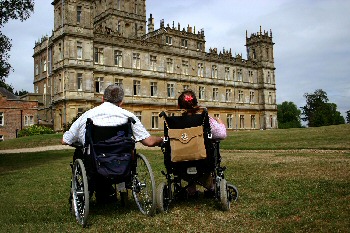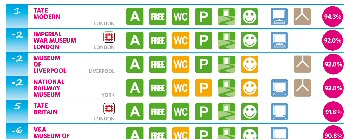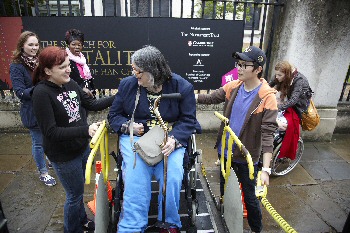|
Accessible
Tourism survey

NORTH West's museums among
best for accessibility, finds new survey by disability charity
Vitalise. But charity warns tourist venues could risk missing out on
a share of £212 billion a year value of 'Purple Pound'
due to
lack of accessibility and launches #AccessNow campaign to push for
urgent change
Museums in Liverpool and Manchester came among the top performers in
a new accessibility survey of the UK's top 100 most visited tourist
attractions, released by the national disability charity
Vitalise. But, Vitalise is warning, many of the North West's leading
visitor attractions could be putting vital income at risk through a
lack of access for disabled visitors.
Among the many visitor attractions excelling for accessibility in
the region were the Museum of Liverpool, which came 2nd in
Vitalise's survey, the World Museum Liverpool at 6th and the
Imperial War Museum North in Manchester, which ranked ninth.
Liverpool's Walker Art Gallery, Merseyside Maritime Museum and Tate
Liverpool, and Manchester's Museum of Science and Industry also
figured among the 30 best performers for accessibility featuring in
the survey. But many people with disabilities could be missing out
on the best of the UK's cultural heritage this half term break due
to a lack of accessibility, the study found. This also means that
many tourist attractions could miss out on their share of the
estimated £212 billion annual spending power of disabled visitors;
the so-called 'Purple Pound'.
Vitalise runs the Sandpipers respite holiday centre in Southport and
regularly takes its disabled guests on excursions to major visitor
attractions in the North West. The charity has today published the
findings of its new survey of the UK's top 100 most-visited tourist
attractions in the form of an easy online reference guide for people
with disabilities.
The study is the culmination of several months of research by
Vitalise to gain an accurate picture of the state of accessibility
across the UK's most popular visitor attractions, as well as to
provide an invaluable online guide for people with disabilities.

The Vitalise study found that:-
► 27% did not have essential
accessibility information on their websites.
►
Only 17% had all their staff
trained in disability awareness.
►
Only 15% were equipped with hoists; an indispensable item for many disabled visitors.
► At the same time as flagging up where more work on accessibility is
still clearly needed, Vitalise also cautiously welcomed other
findings suggesting gradual progress:-
► 82% had overall Vitalise accessibility scores over 70%.
►
36% of the venues surveyed had a
ratio of disabled to non-disabled toilets of 20% or more; greater
than the proportion of disabled people in the general population
(19%).
►
8 out of 10 venues had fully
accessible approaches from outside areas.
...continued... |
 |
...continued...
However, as people around the UK
plan half term trips to local visitor attractions, a recent Vitalise
survey of its guests found that 65% of people with disabilities have
decided against visiting a tourist attraction because they found
their accessibility information to be insufficient, confusing or
difficult to obtain.
This highlights a need for greater clarity, thoroughness and ease of
access in the information tourist attractions provide for their
disabled visitors, suggests Vitalise.
In the light of its research, Vitalise is calling for more effort on
the part of the UK's visitor attractions to become fully accessible
and easier access to key accessibility information online, in order
to ease the worries of people with disabilities. They risk losing
out on a share of the estimated £212 billion annual value of the
'Purple
Pound' if they don't take accessibility seriously, Vitalise is
warning.
At the same time the charity has launched #AccessNow, a new campaign
to enlist the support of people with disabilities in its push for
urgent improvements to accessibility.
Vitalise is asking people with disabilities to share their
experiences of visiting tourist attractions and other public venues
via an online form on the charity's
website or by emailing them to:-
media@vitalise.org.uk.
People are also being encouraged to share their experiences with
Vitalise via social media by posting photos, videos and updates on
Facebook and Twitter, with the hashtag #AccessNow.
Vitalise provides respite breaks for people with disabilities and
carers, combining 24-hour nurse-led care with a real holiday
experience, at Sandpipers and two other accessible UK centres.
Accessible excursions to local tourist attractions are an integral
part of the experience. The charity conducts a thorough assessment
of the accessibility arrangements of each tourist attraction to
which it takes its guests.

Commenting on the charity's survey findings, Vitalise Chairman Mindy
Sawhney said:- "We're delighted to acknowledge the efforts of
those venues that not only represent the very best of our cultural
life, but that are making that cultural life fully accessible to
everyone. The fact that 1 in 3 of us lives with a disability or has
someone close who does strengthens the case that accessibility is
the right thing to do. But we say to tourist attractions that it's
also the smart thing to do. Disabled people and their households
spend around £212 billion each year; have you done everything you
can do to make sure that their spending some of this money with you?
We're asking venues to focus their efforts on three things: first
and easiest make sure your website has clear, practical and accurate
information about accessibility. Shockingly, many do not. Second, be
imaginative about how to make 100% of your visitor experience
accessible to people using wheelchairs. And third, make a hoist
available at every venue: these cost comparatively little to install
and yet are often the determining factor in whether or not a person
living with a disability can enjoy what so many of us can take for
granted. The best advice we can give to venues is to involve people
with disabilities in your plans; they know what real accessibility
means and will tell you the truth about whether you're getting it
right. Finally, we ask visitors to attractions everywhere to tell us
about your experience; the terrific and the terrible; through our
Access Now campaign. Let's build a body of knowledge that makes
planning a trip easy and that provides decision makers everywhere
with overwhelming evidence about the real state of accessibility."
Please email us your views on this
issue to:-
news24@southportreporter.com and
let us know your thoughts about accessibility in and around
Merseyside.
|